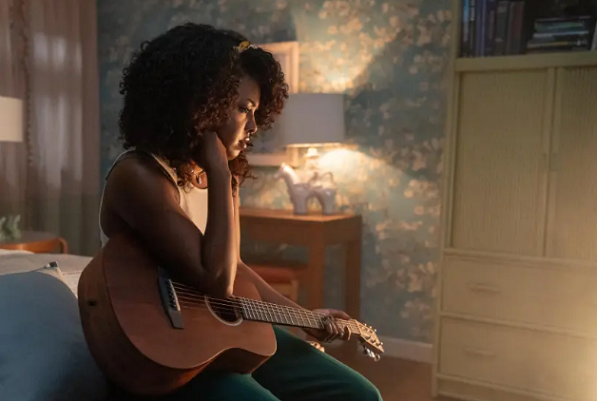The full title of this review by Judy Berman (Time Magazine) is “Hulu’s Black Cake Is a Remarkably Rich Family Melodrama.” Black Cake is a screen series based on the eponymous novel by Caribbean-American journalist Charmaine Wilkerson. Her debut novel Black Cake (Penguin/RandomHouse, 2022) is a New York Times bestseller. [Also see our previous post New Book: Black Cake.]
Caribbean black cake may look humble, but its craggy, unfrosted surface conceals a sumptuous confection that earns its place of honor on the Christmas dinner table. It takes time to make; dried fruit soaked for days, weeks, or more in rum and brandy anchor its flavor profile. Almonds give it substance. Burnt sugar lends the dark color. There are surprising ingredients, like Manischewitz, which is often substituted for brandy. While the recipe probably began life as a variation on the plum pudding imported by British colonizers, black cake is emphatically its own sweet, dense, intoxicating, island-spiced, painstakingly assembled, culturally hybrid thing.
All of which makes it a fitting avatar for the character at the center of Black Cake, Hulu’s epic adaptation of Charmaine Wilkerson’s best-selling novel, which premieres Nov. 1. Although she dies just a few scenes into the eight-episode series, it is Eleanor Bennett—a loving mother who kept a lifetime’s worth of secrets from her children—who grounds this globe-spanning family drama. Cast as the young Eleanor in flashbacks, Not Okay star Mia Isaac skillfully plays against her own Disney-fresh effervescence, endowing the teenage girl with grit and maturity beyond her years. On the fairly frequent occasions when the script errs toward blandness or treacle, Eleanor sets it ablaze, burning off the excess sugar to uncover another layer of richness.
We meet the older Eleanor (Chipo Chung) a year before her death, in present-day Southern California, where a surfing accident leads to a diagnosis of terminal brain cancer. Her loyal son, Byron (Ashley Thomas), a high-achieving oceanographer, rushes to her side. But his younger sister Benny (Adrienne Warren), an artist who has been estranged from the family for eight years—years that included the death of their father—doesn’t show up until it’s time to read the will. Eleanor’s lawyer, Charles Mitch (Glynn Turman), has a surprise for the children she called “B and B.” Their mother left behind hours of recordings that she wants them to listen to together, along with Mr. Mitch. When the time is right, she instructs them, the siblings should take out of the freezer a small black cake that she’s baked for them and share a slice in her honor.
The series weaves together B and B’s now-parentless present with the saga that unfolds in their late mother’s oral history, a tale that stretches back to her 1960s childhood in the West Indies and contradicts everything they thought they thought they knew about her. Eleanor told her children she grew up in an orphanage. In fact, she was raised by a Chinese father and a Black mother who left the island when she was still a little girl. And her real name wasn’t Eleanor Bennett; it was Covey Lin Cook. A talented swimmer with a devoted best friend, Bunny (Lashay Anderson); a gentle boyfriend, Gibbs (Ahmed Elhaj); and dreams of competing on an international level, teenage Covey is thrust into adulthood when her desperate, alcoholic dad Lin (Simon Wan) negotiates her marriage to a local gangster, Little Man (Anthony Mark Barrow). Backed into a corner, she reluctantly goes through with it. But when Little Man is poisoned at the wedding reception, Covey fakes her own death and flees to England, where Gibbs is studying.
The mystery of who really killed Little Man persists as the girl born Covey travels across the Atlantic and back, over the course of several years, adopting and discarding new identities to hide from those who might want to avenge him. As Byron starts to unravel at the news that his mom was not the person she’d led him to believe she was, Benny finds some comfort in Eleanor’s shocking revelations. Her seemingly perfect mother had, she now realizes, struggled and suffered and made choices that haunted her for the rest of her time on Earth. [. . .]
For full review, see https://time.com/6330168/black-cake-hulu-review/5
[Shown above: Adrienne Warren in Black Cake. James Van Evers—Hulu.]


I am episode three. Being Caribbean myself, I can identify with majority of the topics. Which is why I’m going to give this show a chance. My family have a story as well and being in those times. It all sounds about right and make sense. Covey isn’t the first or the only person that used other peoples’ name and fled the country by boat because of whatever reasons they may have. Her mother leaving her behind to flee the country is STILL a thing. It’s a norm. Some send for their family, and some will never be able to touch them ever again due to circumstances. That was definitely a thing in those days and now.
Computers weren’t around to track you from country to country. People had to rely on news paper articles.
LikeLike